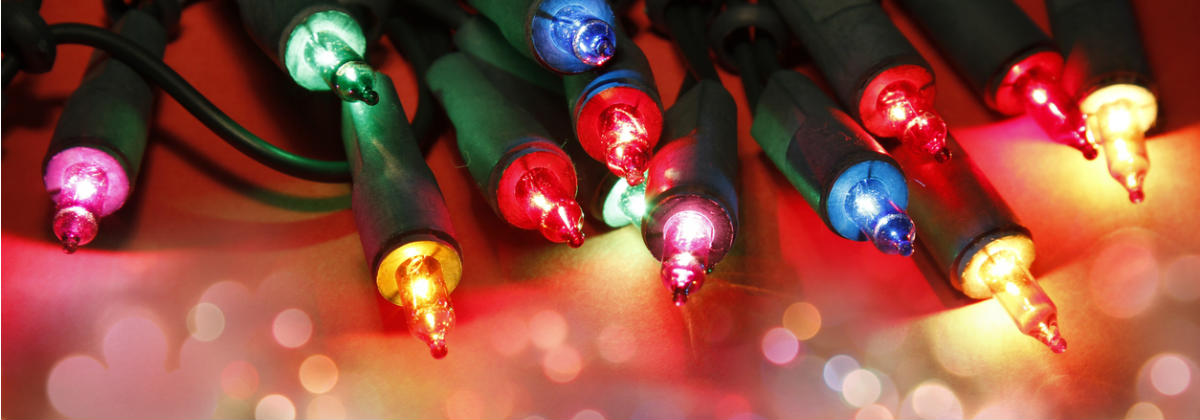Christmas is a joyful time of coming together with friends and family, and what better way to get into the spirit than with Christmas lights? But once Santa has been and gone, and those dreaded post-Christmas bills start rolling in, we quickly come dashing back to reality.
There is a long held belief that Christmas lights are a major culprit of Christmas bill shock, but we’re here to tell you that’s not quite the case these days. So how much are those Christmas lights really adding to your electricity bill? We’ve wrapped up the numbers below.
On this page:
How much do Christmas lights cost to run?
LED Christmas lights will only add $1 to $5 to your electricity bill over the Christmas season. Nearly all modern day Christmas lights are LEDs, which have become popular due to their minimal electricity usage. After comparing dozens of lights, we found the average set of Christmas lights will consume 1.2W to 2W of electricity for every 100 LED light bulbs.
The below table compares the running cost of LED Christmas lights. For the purposes of this illustration, we are assuming an electricity usage rate of 31.88c per kilowatt hour (kWh). Depending on your distributor, provider and plan type, your usage rate will typically fall between 25c/kWh and 45c/kWh on the upper end.
LED Christmas lights running cost
| Number of lights | Wattage | Hourly cost | 24 hour cost | Seasonal cost* |
|---|---|---|---|---|
| 250 | 3.6W | 0.10c | 3.00c | $0.77 |
| 500 | 6W | 0.20c | 5.00c | $1.29 |
| 1200 | 12W | 0.40c | 9.00c | $2.57 |
| 2000 | 20W | 0.60c | 15.00c | $4.28 |
*Assumes lights used 24 hours a day for the whole month of December (4 weeks)
Bear in mind that while many LEDs only consume 1.2W per 100 bulbs, some may use nearly twice as much electricity, particularly those which flash or twinkle. Fortunately, even the most power consuming LEDs out there will only cost you a few dollars at most this Christmas.
Christmas lights can last many years when cared for, but if you’re still parading the incandescent fairy lights you bought 10 years ago, it’s probably in your best financial interests to move with the times and make the switch to LED Christmas lights. The savings on electricity will pay for the lights itself.
How you can reduce your power bill this Christmas
- Consider solar Christmas lights: Solar Christmas lights are becoming increasingly popular as they cost literally nothing to power. The main drawback is, of course, that they require sunlight, which will only power the Christmas lights for a few hours into the night. They may also be a little more expensive to purchase up front.
- Use a timer: If you’re going to bed early, use a switch timer to ensure the lights are not left on overnight, or only showcased for a few hours (this may also avoid complaints from those grinchy neighbours!)
- Plan your light display: As we mentioned, flashing or twinkling lights consume more electricity. Unless you’re really trying to impress, stick with solid Christmas lights. Some more obvious tips are to only turn your lights on when it is completely dark (around 7pm depending on location), only have your display lit through December, and don’t overdo it with the number of lights.
- Switch energy plans: With three fridges on and a house covered in lights, the last thing you’ll want to be paying is high rates. Take some time to compare your power deal with others in market to avoid bill shock at the end of the festive season.
Six cheap energy deals to consider
Here are some of the cheapest published deals from the retailers on our database that include a link to the retailer’s website for further details. These are products from referral partners†. These costs are based on the Ausgrid network in Sydney but prices may vary depending on your circumstances. This comparison assumes general energy usage of 3900kWh/year for a residential customer on a single rate tariff. Please use our comparison tool for a specific comparison in your area. Our database may not cover all deals in your area. As always, check all details of any plan directly with the retailer before making a purchase decision.
Here are some of the cheapest published deals from the retailers on our database that include a link to the retailer’s website for further details. These are products from referral partners†. These costs are based on the Citipower network in Melbourne but prices may vary depending on your circumstances. This comparison assumes general energy usage of 4000kWh/year for a residential customer on a single rate tariff. Please use our comparison tool for a specific comparison in your area. Our database may not cover all deals in your area. As always, check all details of any plan directly with the retailer before making a purchase decision.
Here are some of the cheapest published deals from the retailers on our database that include a link to the retailer’s website for further details. These are products from referral partners†. These costs are based on the Energex network in Brisbane but prices may vary depending on your circumstances. This comparison assumes general energy usage of 4600kWh/year for a residential customer on a single rate tariff. Please use our comparison tool for a specific comparison in your area. Our database may not cover all deals in your area. As always, check all details of any plan directly with the retailer before making a purchase decision.
Here are some of the cheapest published deals from the retailers on our database that include a link to the retailer’s website for further details. These are products from referral partners†. These costs are based on the SA Power network in Adelaide but prices may vary depending on your circumstances. This comparison assumes general energy usage of 4000kWh/year for a residential customer on a single rate tariff. Please use our comparison tool for a specific comparison in your area. Our database may not cover all deals in your area. As always, check all details of any plan directly with the retailer before making a purchase decision.
Image credit: tommaso79/Shutterstock.com



Share this article